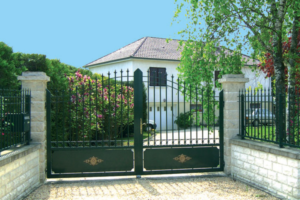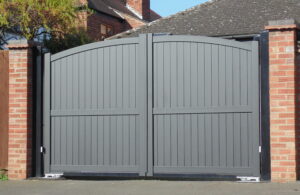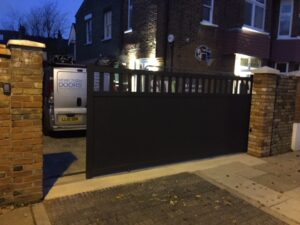Automated gates come in a range of different materials. While wood was once a popular choice, it’s always had its limitations. Prone to rotting and gaining weight when wet, placing extra strain on the fittings, wooden gates need regular maintenance to keep them looking good.
Increasingly, people are moving away from wooden gates in favour of metal alternatives. These can be particularly appropriate if you plan to automate your gates.
Both steel and iron have been widely used in the past to construct gates, with aluminium a relatively new arrival. What’s the difference between the different types of metal gates and how do they compare?
Weight

One of the key factors when it comes to choosing gates is their weight. This is a key consideration if you intend to automate your gates. It will determine the type of motor and the power output you will need, and how often your gate system will need to be serviced.
More weight means more wear and tear on nearly all of the components. A motor that has to move a heavy gate will need to work much harder than one connected to a more lightweight option.
Both steel and iron gates are heavy. Aluminium, however, combines strength with relative lightness. They’re easier to open and close, require less motor force and cause less wear and tear on the component parts. The moving parts used on aluminium gates are likely to last longer than those used in conjunction with steel and iron.
Safety
Closely connected to the weight issue is safety. Although all automated gates should be designed with safety as a consideration, the extra weight of steel and iron gates creates a larger safety risk. If safety precautions fail, the weight of steel and iron gates hitting a person or an object is considerably more than aluminium gates. Less force is required to move aluminium gates, so there is less force acting on the gates. For the overwhelming majority of people with automated gates, the safe operation of their gates will never be compromised, but it can be a consideration. Overall, aluminium gates are safer and more energy efficient than heavier alternatives.
Repair

If rot is an issue to be aware of with wooden gates, then rust is something that you’ll need to consider with some kinds of metal gate. Both iron and steel gates are likely to develop rust issues over time when they come into contact with oxygen and water. To repair the issue you’ll need to clean off all loose rust and paint, and treat them with rust inhibitors and primer before repainting. Left untreated, the problem will get worse over time.
Aluminium gates don’t rust. As well as making aluminium gates look attractive, the coating they’re given also helps to protect them from corrosion. This means that not only are they protected, they will look good for years to come.
Durability
Both steel and iron are long-lasting and durable as a choice for gates. If they’re well maintained they will last considerably longer than wooden gates. For this reason, many people will opt for iron or steel gates believing them to be unrivalled when it comes to durability. This isn’t the case. Contemporary aluminium gates are just as durable as gates made from iron or steel. They require very little in the way of maintenance, and an occasional wipe down with a damp cloth to remove surface dirt should keep them looking as good as new.
Appearance
One of the principal reasons for the continued popularity of wood as a material for gates is its appearance. There’s no denying the undoubted beauty of wood as a natural material. If you’re willing to accept that its lifespan will be shorter, and that extra maintenance will be required, then it can be a good choice.
The same applies to wrought iron, which can be used to create beautiful designs, some of them quite intricate and specialised. Steel as a gate material is less associated with aesthetics and is more about high-levels of security. For that reason, it’s often the material of choice in busy commercial settings.
Aluminium gates are made from aluminium extrusions which are both strong and light. A tough protective surface coating is bonded to the surface of the aluminium. This gives the gates their colour, texture and any wood-effect finish. They can be made to look like traditional wooden driveway gates, ornate wrought iron gates, even five bar gates. Contemporary designs that combine functionality and good looks are popular with homeowners.. They add kerb appeal to your home without requiring constant maintenance.
The bottom line
Now we come to that all important cost consideration. While steel gates may give you the feeling of extra security you need at your commercial premises, they will cost you more than some of the alternatives. Bespoke wrought iron gates can be beautiful, but you need to spend more. Aluminium gates will generally cost less than either iron or steel, without losing any of the aesthetic appeal of the former.
Overall, aluminium gates look great, are cheaper to run and need practically no maintenance.
Why not take a look at the incredible range of aluminium gate designs we have available at Stargate today?
